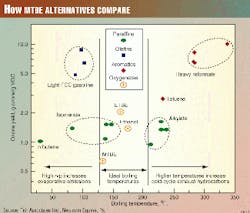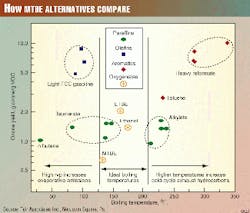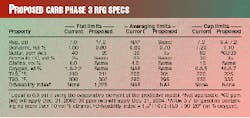Controversy over MTBE in gasoline rages on
California's pending ban of the gasoline additive methyl tertiary butyl ether is continuing to cause controversy among refiners, oxygenate producers, and other stakeholders in the debate.
California Gov. Gray Davis issued an executive order in March banning MTBE from the state's gasoline by the end of 2002. The timetable for the ban was later relaxed when California Senate Bill 989 changed the deadline to "as soon as possible," allowing refiners more time to make the operational changes needed to produce on-spec California reformulated gasoline (RFG) without the use of MTBE.
The state's decision has far-reaching effects, and groups including methanol producers, environmental organizations, and the driving public want to have their viewpoints considered. The continuing uncertainty surrounding the likely fallout from the California ban was apparent from the discussion at an October conference on oxygenates and methanol, where representatives of various interest groups ardently defended their motor-fuel additive choices.
Speakers at the DeWitt & Co. Inc. conference in Houston who favor the use of oxygenates in gasoline worked to mitigate the impact of a report on the subject compiled by a government-selected panel and published July 27, 1999 (OGJ, Aug. 2, 1999, p. 35). The panel urged a reduction in MTBE use and recommended waiving the federal oxygen requirement, which would leave California refiners free to devise alternate methods of producing California RFG. (The federal RFG program requires the use of 2.0 wt % oxygen in gasoline sold in ozone nonattainment areas; this oxygen concentration corresponds to 11 vol % of MTBE or 5.7 vol % of ethanol.)
At the DeWitt conference, the ethanol industry pointed out the renewable characteristics of its additive. And the refining industry, represented by ARCO, touted its need for flexibility, not preferring any one oxygenate, or even any oxygenate at all.
Blue-ribbon panel
US Environmental Protection Agency official Karen Smith defended the report issued by EPA's blue-ribbon panel, appointed by Administrator Carol Browner in November 1998 in response to concerns over instances of MTBE-contaminated drinking water.
Smith commended members of the panel, who she said came into the six panel meetings with no preconceived agenda.
The panel made several recommendations to EPA related to minimizing water contamination and maximizing air-quality benefits. A substantial reduction of MTBE use and the removal of the federal oxygen requirement are especially controversial among oxygenate producers. Other recommendations addressed underground storage tanks (UST), safe drinking water programs, and public education.
MTBE proponents say that the recommendation to reduce the use of MTBE is an overreaction. MTBE is not a public risk, they say; only about 1% of MTBE-contaminated drinking water suppy has contamination levels exceeding EPA health advisory levels (20 ppb or higher).
Oxygenates defenders
Although oxygenates proponents rallied in support of maintaining air-quality benefits-an issue emphasized by Smith-they believe the panel did not adequately stress the role of oxygenates in achieving these benefits and went too far in suggesting the removal of the federal oxygen requirement for RFG.
Terry Wigglesworth, executive director of Oxygenated Fuels Association, Arlington, Va., rebuked the blue-ribbon panel for using mostly pre-1997 data on MTBE groundwater contamination to conclude that use of MTBE should be reduced substantially. According to Wigglesworth, in 1997, UST owners had upgraded only about 44% of their tanks to comply with EPA UST regulations. In 1998, about 68% had upgraded their tanks, and 100% compliance is expected by 2000.
William Piel of Teir Associates Inc., Newton Square, Pa., pointed out that it takes about 2 years for leaks to migrate from the source, which means that contamination discovered in 1997 came from tank leaks in 1995.
A refocus on the true cause of groundwater contamination, which is leaking USTs, said Wigglesworth, will solve MTBE concerns. "People seem to have forgotten that it is not just MTBE leaking out of the tanks," she said, "it is gasoline that is leaking."
Furthermore, she questioned refiners' ability to make a cleaner-burning gasoline without MTBE. Can refiners produce cleaner-burning gasoline without MTBE in sufficient quantities and at a reasonable price, without air-quality backsliding?, she asks.
Alternatives
More than 85% of RFG uses MTBE, vs. 8% for ethanol. For today's vehicles, a ban on MTBE means increased use of ethanol, alkylates, olefins, and aromatics.
Increased production of alkylates and olefins would displace gasoline volumes-not an attractive option for most refiners. And, although aromatics also provide octane, they increase air toxic emissions.
To show the benefits of MTBE, Piel compared it with some alternatives (see graph). These alternatives are less favorable than MTBE, he says. Although lower boiling temperatures correspond to lower T50 distillation temperatures (the temperature at which 50% of a sample has been distilled), higher rvp's increase evaporative emissions. Too high a boiling point, on the other hand, can increase exhaust emissions during cold cycles.
Alternative oxygenates include ethanol, ethyl tertiary butyl ether, tertiary amyl methyl ether, and tertiary butyl alcohol. The California Energy Commission evaluated the use of these oxygenates in a report, "Supply and Cost of Alternatives to MTBE in Gasoline," in February 1999. The commission estimated that the intermediate- term (3 years) effects of banning MTBE in California could range from decreasing gasoline prices by 0.2¢/gal to increasing prices by 7¢/gal.
Like MTBE, these other oxygenates are soluble in water and may well find themselves in detectable levels in groundwater, also. The EPA panel recommended continued research on the health effects of any ethers, alcohols, or components that may replace MTBE in gasoline.
MTBE vs. ethanol
Both MTBE and ethanol increase gasoline octane and reduce carbon monoxide emissions. But preliminary results of a study by the California Air Resources Board (CARB) showed that gasoline blends containing 10% ethanol and having a maximum rvp of 8.0 psi have drastically increased hydrocarbon emissions over MTBE blends.
In addition, one attendee noted that people are failing to consider that oxygenated gasoline commingled with nonoxygenated gasoline in a gas tank increases tank vapor pressure and thus volatile organic compounds.
Although Davis's executive order to phase out MTBE dismayed MTBE producers and many refiners, ethanol supporters welcomed the move as an opportunity to displace MTBE with their product.
Ethanol supporters oppose the bill that would waive the federal oxygen standard in California's federally designed ozone nonattainment areas. If passed, this bill would reduce the potential market for ethanol as an MTBE replacement.
A bill backed by Sen. Tom Daschle (D-SD) requiring a renewable component in all fuels is supported by ethanol producers. Bill Covey, manager of specialty products at ARCO Products Co., Long Beach, Calif., predicted great damage, should this bill come to pass: "Though this sounds like a wonderful environment, it is a formula for long-term disaster for any industry. Prices would spike, inefficient plants would be easily justified and constructed."
Covey noted, however, that ARCO can make gasoline with ethanol that meets CARB standards. ARCO can make up for the increased rvp by adding iso-octane, which has a very low vapor pressure, he says.
Covey estimates the removal of the oxygen requirement by itself would reduce MTBE usage in California by 50%. He said, "To MTBE producers, this does not sound very good. But it is better than an outright ban. It could give MTBE producers time to address the nation's concern about their product and the nation's drinking water supply."
A refiner's view
Like many refiners, ARCO wants the government to remove the oxygen mandate and let refiners choose how to formulate gasoline to meet specifications. Although this is a technically ideal option, it is one rooted in political controversy.
But California refiners appear to be taking a market-driven approach to the MTBE controversy. Although ARCO prefers to see a waiver of the federal oxygenate standard vs. a ban on MTBE, it says it is ready to align itself with its customers' needs and concerns. And both ARCO and Chevron claim that they can make RFG without oxygenates and still meet CARB specs. Chevron has produced nearly 1 billion gal of oxygenate-free gasoline.
While the oxygenate controversy continues to be debated in California, CARB is working toward its next tier of RFG specifications. At the DeWitt conference, CARB official Dean Simeroth presented the proposed specifications for CARB Phase 3 RFG, which is scheduled for a board hearing this month (see table).
Simeroth emphasized that Phase 3 California RFG will provide additional flexibility to refiners while reducing state air emissions. Meeting the new gasoline specs is expected to cost the California refining industry $1 billion.


